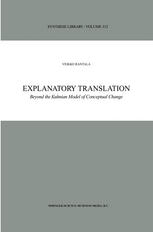

Most ebook files are in PDF format, so you can easily read them using various software such as Foxit Reader or directly on the Google Chrome browser.
Some ebook files are released by publishers in other formats such as .awz, .mobi, .epub, .fb2, etc. You may need to install specific software to read these formats on mobile/PC, such as Calibre.
Please read the tutorial at this link: https://ebookbell.com/faq
We offer FREE conversion to the popular formats you request; however, this may take some time. Therefore, right after payment, please email us, and we will try to provide the service as quickly as possible.
For some exceptional file formats or broken links (if any), please refrain from opening any disputes. Instead, email us first, and we will try to assist within a maximum of 6 hours.
EbookBell Team

4.1
10 reviewsIn this book, Veikko Rantala makes a systematic attempt to understand cognitive characteristics of translation by bringing its logical, pragmatic and hermeneutic features together and examining a number of scientific, logical, and philosophical applications. The notion of translation investigated here is called explanatory, but it is not a translation in the standard sense of the word since it admits of conceptual change. Such translations can take various degrees of precision, and therefore they can occur in contexts of different kinds: from everyday discourse to literary texts to scientific change. The book generalizes some earlier approaches to translation, especially the one presented in David Pearce's monograph Roads toCommensurability. Rantala argues that the notion has something in common with Thomas Kuhn's earlier conception of scientific change and his views of language learning, but it can be used to go beyond Kuhn's well-known ideas and challenge his criticism concerning the import of the correspondence relation.